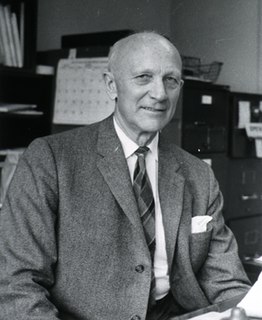A Quote by John Ruskin
It is a strange thing how little in general people know about the sky. It is the part of creation in which nature has done more for the sake of pleasing man.
Related Quotes
In spite of all these disquieting triumphs in the field of natural science, it's astonishing how little man has learned about himself, and how much there is to learn. How little we know about this brain which made social evolution possible, and of the mind. How little we know of the nature and spirit of man and God. We stand now before this inner frontier of ignorance. If we could pass it, we might well discover the meaning of life and understand man's destiny.
Man is merely a frequent effect, a monstrosity is a rare one, but both are equally natural, equally inevitable, equally part of the universal and general order. And what is strange about that? All creatures are involved in the life of all others, consequently every species... all nature is in a perpetual state of flux. Every animal is more or less a human being, every mineral more or less a plant, every plant more or less an animal... There is nothing clearly defined in nature.
All the dignity of man consists in thought. Thought is therefore by its nature a wonderful and incomparable thing. It must have strange defects to be contemptible. But it has such, so that nothing is more ridiculous. How great it is in its nature! How vile it is in its defects! But what is this thought? How foolish it is!
It is a general principle of human nature, that a man will be interested in whatever he possesses, in proportion to the firmness or precariousness of the tenure by which he holds it; will be less attached to what he holds by a momentary or uncertain title, than to what he enjoys by a durable or certain title; and, of course, will be willing to risk more for the sake of the one, than for the sake of the other.
Be creative in that sense and your creativity will become an offering to God. God has given you so many gifts, Garima; something HAS to be done just in deep thankfulness. But remember: with no motive, not as a means but as an end unto itself. Art for art's sake, and creation for creation's sake, and love for love's sake, and prayer for prayer's sake.
There are some people who think that they should be always mourning, that they should put a continual constraint upon themselves, and feel a disgust for those amusements to which they are obliged to submit. For my own part, I confess that I know not how to conform myself to these rigid notions. I prefer something more simple, which I also think would be more pleasing to God.
There are hidden contradictions in the minds of people who "love Nature" while deploring the "artificialities" with which "Man has spoiled Nature.'" The obvious contradiction lies in their choice of words, which imply that Man and his artifacts are not part of "Nature" : but beavers and their dams are.
Stories about mental aberration and oddity only make sense in context. Just how do people live with someone who is peculiar, gifted, strange or alien? It's odd because there's a little part of me that wants to write about exotic, strange bizarre subjects. Instead, I've rather reluctantly realised that what I write about is families.
. . . the whole idea of WHAT HAPPENED WAS.... is not about dating. It is more about people who are not committed to who they are or are indifferent about their life in general, which is how I felt about myself when I wrote it. I had turned 40 and I was unhappy and I wanted to write about that. Dating just became the framework. . . . I like all those fringy, weird, nonverbal, quiet, tiny little things, those powerful interchanges between people, things that go unsaid, that people know are happening all the time but nobody wants to talk about. That's what I want to make movies about.
There is a great difference, whether the poet seeks the particular for the sake of the general or sees the general in the particular. From the former procedure there ensues allegory, in which the particular serves only as illustration, as example of the general. The latter procedure, however, is genuinely the nature of poetry; it expresses something particular, without thinking of the general or pointing to it.




































